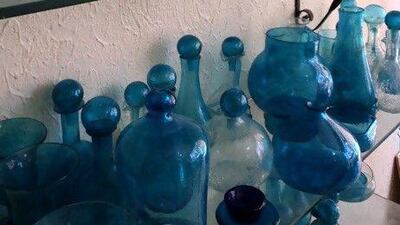Perched on a small cushioned stool, the 28-year-old Mahmoud Khalifeh sits facing a 1,400-degree oven door, quickly turning a metal rod, which, every now and then, he blows into. A glowing blob of glass lengthens and expands with his movements.
Khalifeh is carrying on the glass-blowing trade his grandfather began more than 50 years ago in the southern Lebanese town of Sarafand. When Husein Khalifeh started the small workshop on the main road running through the town, business was good: locals were employed to continue the seaside town's ancient tradition. Now, it's a different story.
Expensive running costs
Sarafand, once known as Serepta, was a trading post filled with artisans. The Khalifehs now run one of two glass-blowing workshops in the whole of Lebanon. Decrease in demand and lack of interest in the craft now mean that the Khalifehs turn the oven on for one month, then keep it off for two. Running costs are high. "In Syria, it's like US$20 [Dh74] a day," says Mahmoud's sister, Nisrine. "For us, it's $200 a day."
Most of the Khalifehs' business comes from stores in Beirut such as Artisans du Liban, or from weddings and private orders - but it's not enough to keep the ovens on full-time. In the off months, fishing and construction are the order of the day.
Glass-blowing is not Lebanon's only dying art. Nazih Baz is the last weaver of his family still practising. He has been working on his loom every day for 25 years, and contrary to what passersby might assume, it's not a hobby: "It's a job."
Baz carries out the technique on a nearly 200-year-old loom, creating unique designs that sell for prices ranging from $800 to $6,000. While the prices might seem steep, the time and effort each piece requires demands the higher cost.
Marketing is the key
Low demand and high production costs are constant hurdles for these trades. The global economic slowdown and regional problems don't help, either. But it's not all bad news. Non-governmental organisations (NGOs) and high-end designers are making their own contributions to keeping these once-dying crafts going.
Baz works with the NGO Beyond Beirut and the Lebanon Mountain Trail organisation to keep people aware of his work.
Azm for Crafts, the corporate social responsibility arm of a Lebanese multinational company, has been working with Lebanese artisans since 2010 to either revive or keep going the practices that were quickly fading.
The group's general manager Ohannes Khoustekian is working on four sectors: blown glass, soap, herbal infusions and hammered brass, largely based in the northern city of Tripoli.
"This city has the highest rates of unemployment in Lebanon," says Khoustekian, "and our mission is to develop the craftsmen, to lead them to produce market-demanded handmade crafts, create jobs and keep people in their homeland."
Indeed, the glass-blower he works with had turned off his oven at the start of the century due to lack of demand, but started working again two years ago.
Glass and soap produced with help from Azm for Crafts are now being supplied to hotels, restaurants and boutiques from Beirut to Qatar and Paris.
Preserving the trade
The work with local artisans is done to make sure their precious skills are preserved for future generations.
This is part of the "manifesto" laid out by the Bokja furniture designers Hoda Baroudi and Maria Hibri. The embroiderer Abou Yousef, 53, credits them with helping him retain his passion as his source of income. "I studied history at university but this has been my trade," he says. "I love it. It's my life."
Reviving old needlepoint techniques is just one part of Baroudi's and Hibri's work with artisans from Lebanon. Mahmoud, in his 50s, is responsible for their woodwork. "When we came across Mahmoud 12 years ago, he was squatting," says Baroudi. "He had been doing woodwork but we worked with him to improve his skills and now he's earning more than $2,000 a month working with us."
"Compared to many countries in the region, Lebanon is blessed," says Frank Luca, the co-founder of the Middle Eastern artisan boutique Orient 499. Since opening in 2006, he and his partner Aida Kawas have worked with an increasing number of artists. "We started with five and now we work with more than 50 people."
The future
While admitting that she doesn't have a Facebook page for the family business - something that would undoubtedly expand their client base - Nisrine Khalifeh says glass-blowing is hard work for her brother. Khoustekian is more positive, however, saying that in the next 10 years, handicrafts such as glass-blowing and weaving will be in a far better state: "In this era of globalisation, people will work harder to bring out their own culture that distinguishes them from the rest of the world."
Visit www.orient499.com, www.bokjadesign.com and www.beyondbeirut.com

